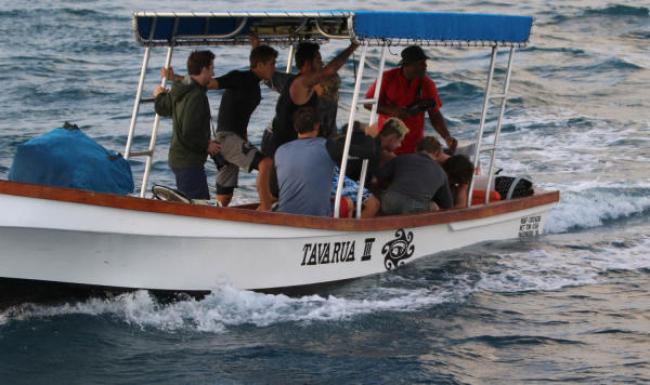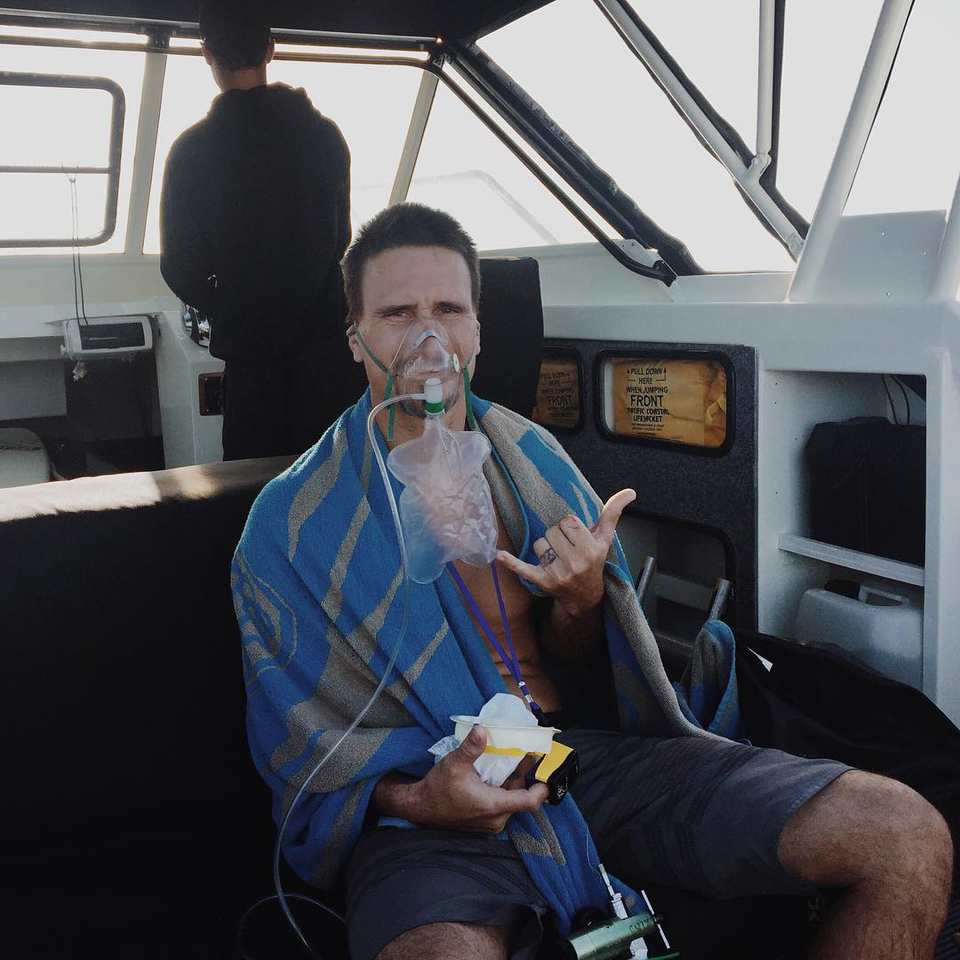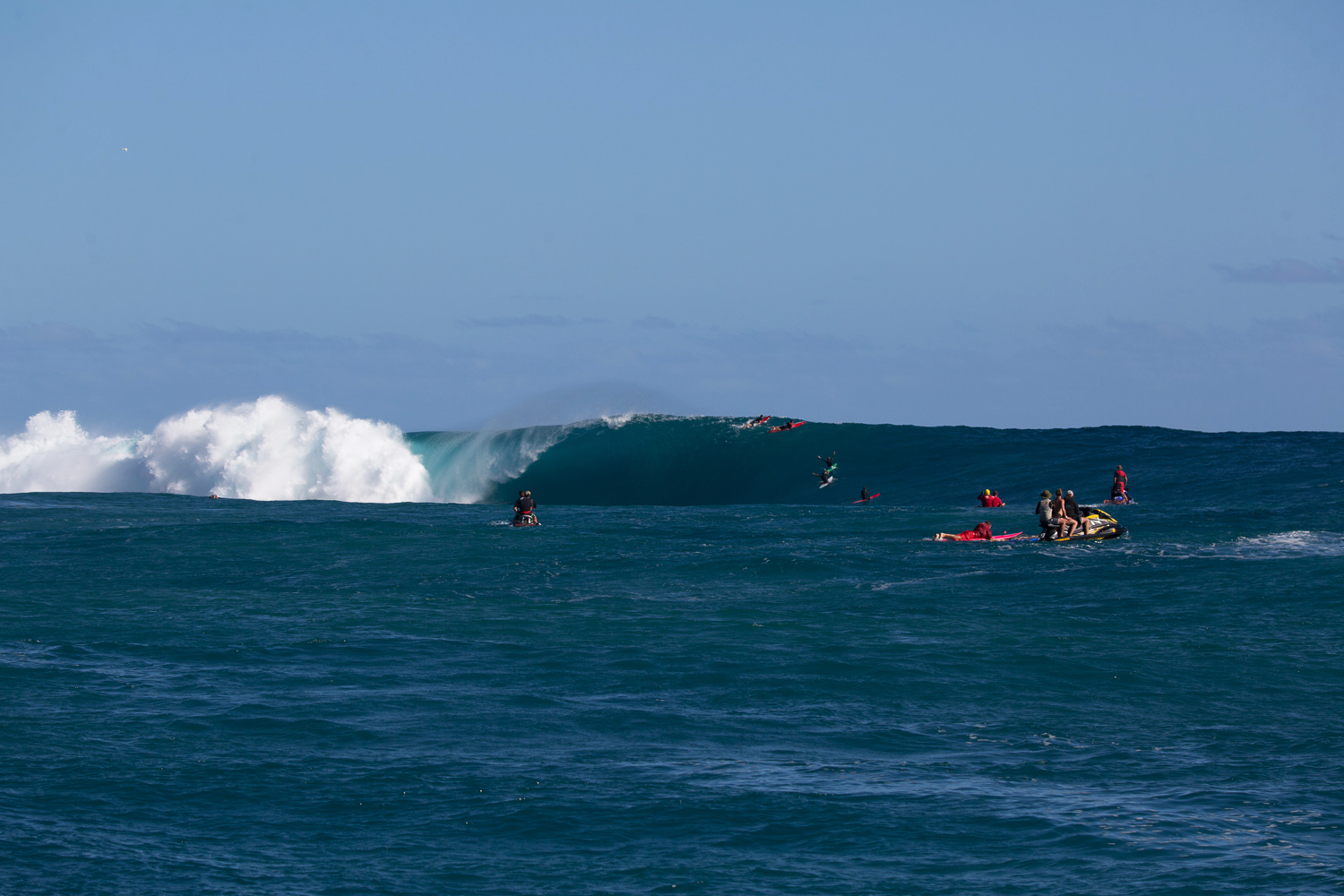Aaron Gold Recounts His Near-Death At Cloudbreak
“…and that’s when the second wave hit. And then the lights just went out.”
What a year it’s been for Hawaiian big wave enthusiast Aaron Gold. He paddled into one of the biggest waves ever at Jaws, secured a top ten spot in The Eddie, tore his head open at Gas Chambers and scored a slot on the Big Wave Tour. You have also heard from all corners of the surf-media world that he nearly drowned during the early sessions of last week’s monster Cloudbreak swell. Well, thankfully he survived the two-wave hold down, was rescued by Uri Kurop and, after spending the week recuperating with family, has opened up in an interview with Matt Rott of Magicseaweed. Here’s what Mr Gold remembers from the day he almost died in paradise:
“Yeah, it was a crazy scenario, the whole thing and the way that it went down. Even the way it happened…I was being held down and I didn’t have any of those normal feelings where I’m getting close and seeing stars, and knowing that I’m close to blacking out. It wasn’t like that. It was like the light switch just shut off, and then, when I came to, I knew exactly what was going on. I knew exactly what had happened. But I never had that experience of fear and being in some crazy situation.”
“Well, we got out there early and it was around 6 to 10-feet, maybe a few bigger ones, but we knew it was going to build. And I figured that was the window, because the forecast was for the wind to pick up. So we decided to go for a warm up, and weren’t really concerned. It wasn’t huge, I’ve surfed 10 to 12-foot waves like that thousands of times, so it didn’t feel like a big deal at all. So I didn’t put my floatation on, which was a mistake, and a learning point for me.”
“But you never know what would have happened. You know, if I’d had my floatation on, maybe I would have been fine, or maybe I would have been pushed to a different spot, or maybe my leash would have broken and they wouldn’t have been able to find me. So it was what it was. But I take it as a lesson. I was on a different board than normal too—I just figured I would switch it out when it got bigger. But I knew it was a long-period swell and was filling in fast, and in the future I’ll make sure I have my equipment ready, floatation and boards. Lesson learned.”
“I actually got caught by one wave right when I paddled out, and that sort of got me in the zone. And then the one I went for, I could have gone for the first wave of the set, but thought there might be a better one behind it. And when the second wave came, I thought I had the easiest roll-in. Even Benji (Brand) said the same thing, he said it looked like I had the easiest, most buttery entry. But when I started to paddle in, it ledged up and the wind caught underneath, and I was sort of stuck wondering what to do, because I wasn’t over my board. So I didn’t know if I should try to grab and stick the landing, or bail. I was in the air already, and I decided to get away from the board, and I landed on my side and got whiplashed and slapped a bit. But I penetrated. I was under for awhile, pretty deep, and it dragged me really far. And when I felt the water start to relax, I knew I needed to get up, so I started climbing my leash. And I got all the way up, and could feel the board and see the light at the surface, and that’s when the second wave hit. And then the lights just went out.”

Aaron was still unconscious when he was pulled onto the boat. After about a minute of CPR he was breathing again. Photo: WSL
“The next thing I remember, I woke up on the boat and knew exactly where I was and what was going on. I knew my neck was whiplashed, but that my back was fine. And I knew I hadn’t hit bottom. It was just crazy. I’ve been through similar wipeouts hundreds of times, and I guess this time was supposed to happen this way. And even the way it worked out that Uri saved me, and I actually was staying with him. Kaiborg had set it up for me to stay with him, and I was just sort of going with the flow, everything sort of came together. I had a bunch of other guys who had offered to help me with logistics on this trip, and most of them were staying on the island, so I could have easily ended up staying with them. But I ended up with Uri. And he is the one who found my board floating, and he didn’t know where I was. He said it looked like I’d broken my leash. But then he said he saw my kids in his mind, and decided to jump in and look for me, and he basically landed right on top of me.”

“I got all the way up, and could feel the board and see the light at the surface, and that’s when the second wave hit. And then the lights just went out.”
“Uri is ex-military, so he knows what he’s doing when it comes to rescue. We all do. But he lost the lanyard for his ski when he jumped in, and then Larry (Haynes) came in and they got me up on the ski. And Uri pulled the kill switch out with his finger, which was fast thinking, and they got the ski going and got us out of there. But the crazy thing is that if you look at that day, it was just non-stop waves the whole day. But after my wipeout, the ocean went flat for like 15 minutes, so that is why they were able to get me out, I think. It was just crazy, how everything came together. Uri said he doesn’t even know how we got out of there—it was amazing to him that we made it out.”
“When we got to the boat, the guys that were working on me were the guys I travel with and train with for safety. Mark (Healey) and Greg (Long), their boat was actually the farthest away, but they saw what was happening and knew something had gone wrong. So they came in close, and they did an amazing job. But Greg did an amazing job with the compressions, and Healey did the dirty work, sucking face with me. I’m just so thankful that they were there. The way that they performed the rescue and resuscitation was incredible. I got to the doctor, and they looked at me and were blown away that I didn’t have more water in my lungs, and that I didn’t have any broken ribs. Because when you get CPR, normally you end up with a lot of broken ribs. I was sore, for sure—I felt like I’d been run over by a truck. But Greg did an amazing job with the compressions, and Healey did the dirty work, sucking face with me. I’m super impressed by how calm they stayed, and focused. These days we are taught not to do breaths with CPR, that it is just the compressions that are important to keep someone alive, but in a drowning incident where there is water in the lungs, those breaths help to bring it up. So the boys were perfect in the rescue.”
“You know, we talk about how important the training is all the time, but that can’t be overstated. Greg’s incident at Cortes was an eye opener, and we started doing safety and stuff after that. But I think it has grown a lot since then. It could have been any one of us who went down, and it would have been the same. We are all trained, and everybody played their parts perfectly. And that’s amazing to me. It’s a testimony to how far it’s come, and our relationships. You know, you are only as good as the guys next to you. And this was a reminder to me that I need to make sure every couple of months that I am sharp. And that applies to everyone, even guys surfing two-foot waves at home. We should all be running scenarios in our minds, and knowing what we would do if something happened to a friend or someone in the lineup.”

“Witnessing Greg Long, Mark Healy and Ryan Hipwood work on Aaron calmly and so professionally was the best thing I’ve ever seen,” said Alex Gray.
With a number of surfing publications having photographers uploading images to social media accounts from the channel, Aaron’s ordeal was basically streaming in realtime, pushing the line between breaking news and ethical discretion for the sake of his family:
“Yeah, that was crazy how that happened. One of the magazines was actually posting about the incident before they even revived me. But we have to realise that a family shouldn’t find out about something like this from a surf magazine’s online post. You know, if I had died and my family found out through Instagram, that would just be super wrong. I know that it’s news and everyone wants to know, and guys want to get the story, but there is a responsibility to the athletes and our families. Yes, report on the story, but at least give us time to get in touch with our loved ones before it’s broadcast everywhere, and to prepare them for the news.”
“People who aren’t clear on the whole scenario might look at it and not understand it, but to me it was just a reminder that you can be taken at any time. You know, you could die of a heart attack walking out your front door. And my goals for catching big waves are trivial. If I don’t catch another big wave in my life, I am okay with that.”
The full interview with Aaron Gold is here:














Comments
Comments are a Stab Premium feature. Gotta join to talk shop.
Already a member? Sign In
Want to join? Sign Up